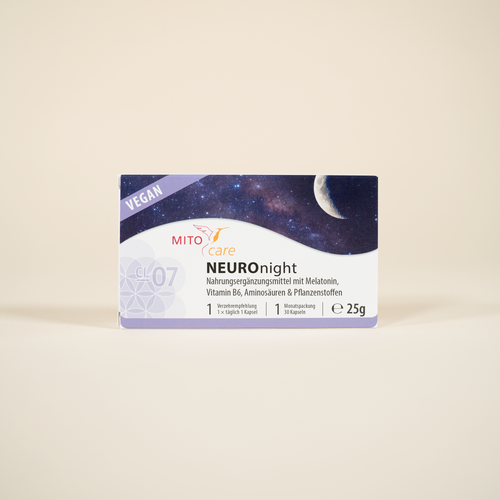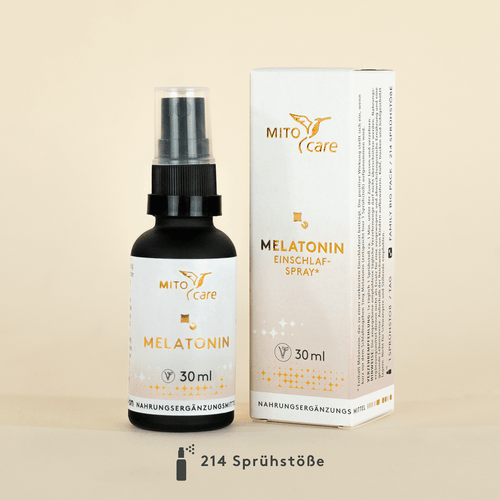Themen dieses Blogartikels:
Table of contents
- Sleep hygiene: a prerequisite for good sleep
- Tip 1: Create routines
- Tip 2: Eat consciously
- Pay attention to timing and duration
- How do caffeine and sleep get along?
- What is the effect of alcohol?
- Tip 3: Do more sport
- When is the best time to train?
- Tip 4: Relax
- Breathing techniques to fall asleep
- Tip 5: Create a personal bedtime ritual
- Listen to binaural beats
- Sip Moon Milk
- Tip 6: Banish bad thoughts
- Tip 7: Optimize your sleep environment
- 3 factors and tips for better sleep
- Tip 8: Cell phone, laptop, TV: Just switch off for a while
- Tip 9: Melatonin for a balanced sleep-wake rhythm
- Tip 10: Get to grips with sleep theory
10 tips for better sleep
Tip 1: Create routines
Various cycles, sleep phases and recurring processes take place in your body during sleep. You can do a lot to ensure that your body goes through them well while you are still awake by focusing on routines like your body does, such as starting your day with a short walk if the weather permits. This is because natural daylight supports your sleep-wake rhythm and stops the release of the sleep hormone melatonin. This means you yawn less often and stimulates the production of the happiness hormone serotonin. The result: you feel alert and fit for the day.
Tip: If you want to know more about the body's own hormone melatonin and find out how melatonin affects your sleep, our knowledge blog will provide you with the facts.
Pay attention to timing and duration
How well we start the day also depends on how the previous day ended. The internal clock follows natural daylight. That's why it's best to relax when it gets dark outside.
You can create structure by always going to bed and getting up at the same time and sleeping for enough time to prevent lack of sleep. Various studies recommend around seven to nine hours as the ideal amount of sleep for adults.
Are you having trouble falling asleep after an exciting day full of exciting activities? If you have trouble falling asleep or have insomnia in the evening, exercise, relaxation and a balanced diet can help.
Tip 2: Eat consciously
Your brain produces the hormone melatonin, which is important for your sleep rhythm, from the happiness hormone serotonin. This in turn is produced from the amino acid tryptophan, which the body obtains from food.
Tip: A diet rich in tryptophan can improve your natural biorhythm and therefore your sleep quality.

How do caffeine and sleep get along?
Caffeine and alcohol, on the other hand, are not conducive to sleeping through the night. Caffeine suppresses the production of melatonin, which is important for sleep and your tiredness, and has a half-life of around four to six hours.
You should therefore avoid drinks containing caffeine in the second half of the day. Especially if you are sensitive to caffeine, coffee in the afternoon can disrupt your sleep at night.
What is the effect of alcohol?
Alcohol has a different effect: it can have a relaxing effect and help you fall asleep. However, as the night progresses, deep sleep is disturbed and you wake up more often. Alcohol can also reduce REM sleep and leads to a dry mouth and increased sweating.
Drinking a small glass of wine with dinner every now and then is fine. However, you shouldn't overdo it for the sake of a good night's sleep.
Tip: Find out what role vitamins play in sleep disorders.
Tip 3: Do more sport
A study in the Journal of Clinical Sleep Medicine shows that a regular workout can promote restful sleep and alleviate stress. However, an intensive workout directly before sleep can have the opposite effect. This is because your autonomic nervous system needs to calm down afterwards.
When is the best time to train?
Ideally, there should be two hours between a hard workout and going to bed. Relaxation exercises or calmer sports are better suited to helping you fall asleep immediately before going to bed.
Tip 4: Relax
Various techniques can help you to relax deeply before falling asleep and let go of the stress of the day. Well-known techniques include autogenic training, breathing techniques and Jacobson's progressive muscle relaxation, which can put the body into sleep mode.
In brain research, there are more and more studies on the positive effects of regular meditation practice. Just a few minutes can help you to organize your thoughts and relax.
Breathing techniques to fall aslee
A well-known breathing exercise before falling asleep is 4-7-8 breathing. This breathing exercise was developed by the American physician and yoga teacher Andrew Weil and works like this:
- Close your mouth and breathe in slowly through your nose for four breaths.
- Hold your breath for seven breaths.
- Then exhale for eight breaths.
Tip 5: Create a personal bedtime ritual
A bedtime ritual creates peace and relaxation. If you regularly maintain a ritual before falling asleep, you train your body to automatically prepare itself for the upcoming sleep.

Listen to binaural beats
Binaural beats are designed to synchronize human brain waves. Put simply, these are two slightly different frequencies, one for the left ear and one for the right ear, which you perceive as a pulsating sound.
This type of stimulation can provide deep relaxation and therefore also have a positive effect on sleep.
Tip: Research is still in its infancy. But there's no harm in trying. You can find examples of relaxation beats on YouTube.
Sip Moon Milk
Try Moon Milk before going to bed: This natural drink comes from Ayurvedic medicine and is traditionally prepared with ashwagandha. This main ingredient is also known as the sleeping berry.
Tip 6: Banish bad thoughts
Brooding, negative thoughts and stress can be the cause of sleep disorders. One method to give your mind some rest is journaling. Basically, it involves writing in a diary and getting rid of any thoughts that could disturb your sleep. For example, you can
- Reflect on the day
- Write down what you were grateful for
- Write down and prioritize the tasks for the next day
Tip 7: Optimize your sleep environment
The quality of your sleep depends not only on routines and your level of relaxation, but also on your environment. To ensure that you get a good night's sleep, your sleeping area should be designed as optimally as possible.
Which environment is ideal for the quality of your night's sleep depends on various factors and, of course, your personal preferences.
3 factors and tips for better sleep
These points are important:
- Your bedroom should not be too warm or too cold. A sleeping temperature between 16 and 18 degrees is ideal. However, the perfect temperature mainly depends on your personal preference. Perhaps 15 degrees is enough for you, while other people prefer it warm and cozy and sleep best at 20 degrees.
- In addition, your bedroom should not be too loud or too bright. If the conditions are not yet ideal, earplugs, curtains and eye masks, for example, can help you to create better conditions.
- The best place to sleep is in a cozy and comfortable bed. Only you can decide which bed is right for you. The proof of the pudding is in the eating.
Tip 8: Cell phone, laptop, TV: Just switch off for a while
Now you know what belongs in a bedroom that invites you to sleep and relax. However, there are also things that don't belong in your bed or bedroom, as they can promote sleep disorders.
These include the blue light emitted by electronic devices and LED lights. These light sources can reduce the production of melatonin and get in the way of you and your well-earned sleep, so it's best to refrain from checking your email inbox or scrolling through Instagram before going to bed.
However, if you can't do without your phone or laptop in the evening, make sure you use a blue light filter or blue light glasses to filter out unwanted light in the evening.
Tip: See if you are particularly sensitive to light. It may help to turn off all lights half an hour before you go to sleep.

Tip 9: Melatonin for a balanced sleep-wake rhythm
If you've been practicing sleep rituals for a while and have found your routine, it can still happen from time to time that your sleep rhythm gets mixed up.
There are various reasons for this, such as traveling: On a business trip or vacation, it can quickly happen that jet lag strikes cold. In this case, melatonin can help to alleviate the effects of jet lag.
Tip: You can supply your body with melatonin supplements to help you fall asleep faster.
Tip 10: Get to grips with sleep theory
Sleep is much more complex than many people assume. If you look into the subject, you will better understand many of the connections between your everyday life and sleep, get to the bottom of sleep problems and optimize your sleep hygiene.
When your nights get better, this automatically has an effect on your concentration and performance. In our blog, you will therefore find interesting facts about sleep and tips for good sleep and against sleep disorders. You will learn how to effectively combat sleep problems and their causes.





